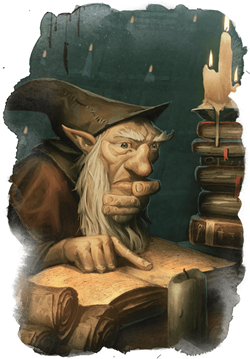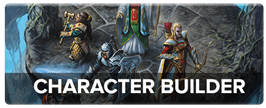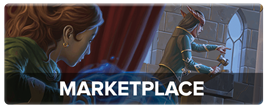 New Player’s Guide is going on hiatus, giving us some space to return to beloved series like Class 101, Spell Spotlight, How to Play Monsters, and to explore new ideas. In the meantime, however, we want to know what D&D questions are burning in your mind, so that we can answer them once we come back. Reply to the comments of this post with ONE question for D&D Beyond’s Lead Writer James Haeck.
New Player’s Guide is going on hiatus, giving us some space to return to beloved series like Class 101, Spell Spotlight, How to Play Monsters, and to explore new ideas. In the meantime, however, we want to know what D&D questions are burning in your mind, so that we can answer them once we come back. Reply to the comments of this post with ONE question for D&D Beyond’s Lead Writer James Haeck.
We’re looking for questions about Dungeon Master skills, player tips, dungeon design, encounter design, magic item design, monster design, and anything else that will help you be the best DM or player you can be!
When New Player’s Guide returns from hiatus, we’ll have combed through your questions with a particular eye for ones that will benefit the entire D&D Beyond community. We can’t wait to read your questions!
Create A Brand-New Adventurer Acquire New Powers and Adventures Browse All Your D&D Content
 James Haeck is the lead writer for D&D Beyond, the co-author of Waterdeep: Dragon Heist, Baldur's Gate: Descent into Avernus, and the Critical Role Explorer's Guide to Wildemount, a member of the Guild Adepts, and a freelance writer for Wizards of the Coast, the D&D Adventurers League, and other RPG companies. He lives in Seattle, Washington with his fiancée Hannah and their animal companions Mei and Marzipan. You can find him wasting time on Twitter at @jamesjhaeck.
James Haeck is the lead writer for D&D Beyond, the co-author of Waterdeep: Dragon Heist, Baldur's Gate: Descent into Avernus, and the Critical Role Explorer's Guide to Wildemount, a member of the Guild Adepts, and a freelance writer for Wizards of the Coast, the D&D Adventurers League, and other RPG companies. He lives in Seattle, Washington with his fiancée Hannah and their animal companions Mei and Marzipan. You can find him wasting time on Twitter at @jamesjhaeck.











-
View User Profile
-
Send Message
Posted Jul 27, 2020The way I run it as an experienced DM
Perception is to notice the general goings-on in an area or room. Perception will tell you if you see someone running along the rooftops or the child snatching coin purses, if you see the tablecloth flickering with the wind or the eyeballs of the painting moving, but you won’t see minute detail.
Investigation is to notice fine detail. Doing a “Where’s Waldo” is an investigation check, as you’re examining for fine detail. Other examples include recognizing runes on a door, hidden writings, false bottoms to chests, and folded papers behind a desk.
For traps and secrets I ask “is the trap big or small? A tripwire may be a perception check, and a relatively easy one that a player may spot automatically if it was done poorly, by say a goblin. But a pressure plate is less obvious, and an active perception check would be needed, as they are viewing the hallway as an overall. An intricate trap, or one that is in a specific area such as a locked door, a chest, or a magic rune on the underside of a desk, I require an investigation check, and the player should specify what it is they are investigating. So for a pressure plate, they are perceiving unusual things in a hallway, but if they are suspicious of a locked door they roll an investigation of the locked door.
Hope that helps
-
View User Profile
-
Send Message
Posted Jul 27, 2020Thanks for the feedback! The truth is this is how I've played those rules but it always felt like P vs I has much more fluid to individual interpretation. For my education, I posted questions in the main forums and how I learned to understand more of the rule either from previous gaming sessions in a sort of checking my work to determine yeah I got it correct. Passive Perceptionsometimes feels not as important as some of the pre-written campaigns use it in but your examples are spot-on for traps so I appreciate that write up as well but is there more to this type of check and more examples that could be filtered out to show how else it could be used.
The heart of my article suggestion was more in line for new DM players who can skip the digging and helpfully get a more in-depth 101 article about these two ability checks.
Thanks again.
-
View User Profile
-
Send Message
Posted Jul 27, 2020In all the campaigns I've played in, our beginning has been very confusing. Random people get grouped together "Because you're the player", not for any discernible reason. Our characters get asked to do something together by a random person, who we've never met. We're expected to drop everything to do this favor for a random person, with people we've never met (And may not like). Most likely, these characters have a "Backstory", but it isn't integrated into the world. I would like an article on how to integrate characters into a world, and how to have them meet and join together.
-
View User Profile
-
Send Message
Posted Jul 27, 2020I'd like to know how to make side-quests more meaningful that just bonus loot.
-
View User Profile
-
Send Message
Posted Jul 27, 2020Good one.
-
View User Profile
-
Send Message
Posted Jul 27, 2020As a player, how do I encourage other party members to role play more? Some people seem to be more hesitant than others, and players are acting like parts of their backstories are all super dark and shouldn't be known by others at all even after adventuring together for a while. No one is willing to open up, and it is kind of frustrating.
-
View User Profile
-
Send Message
Posted Jul 27, 2020This is just my take on it, but a good way to integrate side-quests is to give them some connection to your over-arching story in the larger world. It doesn't have to be an immediately apparent connection. E.G. your big picture story is a quest to dethrone a tyrant who has forcibly ejected the righteous king of your setting, and your sidequest is to retrieve a magic item from the enclave of a group of mercenaries who the players later learn are working for that tyrant. Another useful thing is to allow your sidequests to have an effect on the immediate surrounding area. That might not be useful for you, but I thought I'd just contribute my bit. In addition the DM's Guide has some useful information about tying things into your story in I believe Chapter 6.
-
View User Profile
-
Send Message
Posted Jul 27, 2020This scenario came up in a game I'm in. If a creature reduces a character's stats, such as a Shadow, but that character is in possession of an item that raises its base stat to 19, such as the Headband of Intelligence, does that character's stat drop? The wording of the item implies that it wouldn't, but mechanically that would make a character nearly immortal in such a fight. The way it was ruled for now was that the base score would drop, but as long as the magic item was attuned they would be fine, as per the wording of the item. However, several members of the group are unhappy with this ruling, as it has the potential to be abused by characters with items like this.
What would the proper ruling for this be?
-
View User Profile
-
Send Message
Posted Jul 28, 2020Might it be helpful to pregenerate a base loot prior to your session when you're planning encounters and then you could reward or penalize your players based on how the actual encounter goes.
And when they have random encounters you could have a list of boons you can pick from to give them for successes.
-
View User Profile
-
Send Message
Posted Jul 28, 2020I like the Paladin class, and I think Cleric Is one of the most essential classes. But I'm a Christian and I don't feel comfortable having me or anyone in a campaign I may run play a character who worships a god that the player doesn't worship. And I can't have the Christian God in D&D because I was told that would be taboo. Can I run a D&D campaign without gods and still have Paladins and Clerics?
-
View User Profile
-
Send Message
Posted Jul 28, 2020Of course, Blahdalizer! In the DMG, they mention in the section on creating the gods for your universe that you can have a setting entirely without them. In that case, classes like paladins or clerics would draw their magic from the forces of nature. And as long as the other players in your campaign are cool with it (this is a good question for Session Zero or even way before that), there's no reason you couldn't run a campaign in a world where the Christian God exists (unless that's taboo for religious reasons; I mean there's no reason it wouldn't work for D&D). It all comes down to worldbuilding, but as long as it wouldn't bother anyone in the group, it would work just fine.
-
View User Profile
-
Send Message
Posted Jul 28, 2020Hi I hope I can help, so it all depends on what classes, races, and lots of other things that go into dungeon building. So for a cleric it might be tracking down a long dead person and this person would probably be pretty wealthy so the other players would come along. For a wizard it might be a spell book. Some main ideas that I would used is:
You are hired to go retrieve something, and you find a old treasure map promising money. The map would then take you to a cave or something similar. From there you eventually go onto find a old wizards home. And it is filled with magical items he made.
There is a attack on a city and the whole party’s families are taken by a raiding party, of orcs, Mabey a dragon, religious group, invading army, or something similar. You would then have to go and find the party’s family or something similar.
Whatever area the party is in is on the brink of war! They are enlisted to the army and then have to battle. They could conduct raids on city’s to get treasure, and there could be lots of social interaction, planing, and exploration.
So I guess that the best way to come up with a overarching story plot is to find something that forces the players into doing something, or that they want to do and because they are adventurers, they get wrapped up in it and find they are but a pawn on a chess board.
-
View User Profile
-
Send Message
Posted Jul 28, 2020-
View User Profile
-
Send Message
Posted Jul 28, 2020im curious when something is described as a "negligible" weight. what does that mean? basically nothing? under a pound? a pound? half its normal weight? please help!
-
View User Profile
-
Send Message
Posted Jul 28, 2020I'm interested seeing a "Best magical items for X class" series that help DMs and players see what items each class would want to work towards, it would bring attention to things like Rod the Pact Keeper and Robe of the Archmagi as well as more unique items for each individual class.
-
View User Profile
-
Send Message
Posted Jul 28, 2020Drinking all that ale and what should be done if a PC drinks too much
-
View User Profile
-
Send Message
Posted Jul 28, 2020Question: How would you put water in your dungeon and encounter design and utilise it in different ways. (Can be any Liquid for that matter)
-
View User Profile
-
Send Message
Posted Jul 28, 2020I want to ask how to handle mass combat with 8+ npc enemies
-
View User Profile
-
Send Message
Posted Jul 28, 2020I'd say the things people need to learn the most about:
* Style of play that work at higher levels (for example, how to allow your PCs to use all of their awesome magic and still challenge them),
* Addressing different views on when it is ok to kill an enemy by players. For example, the PCs encounter a tribe in the mountains that have kidnapped nearby villagers. The tribe is taking the villagers to make them mine and gather resources for them. The tribe is doing this because their leader died and they've struggled to survive without her guidance - and that many of them are reluctant. One PC says that they need to either arrest or avoid the tribe while freeing the villagers - and flee rather than fight them. Another says that they need to kill the entire tribe to stop the attacks. A third says that they should try and sneak in and free the villagers, but if caught force may be necessary. The last says they need to solve this with diplomacy and persuasion rather than weapons and stealth. I want to see recommendations on how to navigate these waters when players see moral choices in the game and may be uncomfortable with the directives other players may want their characters to do.
-
View User Profile
-
Send Message
Posted Jul 28, 2020How about some details on two weapon fighting for fighters and non-fighters?
Are there any instances where you can cast a spell and make a melee attack?